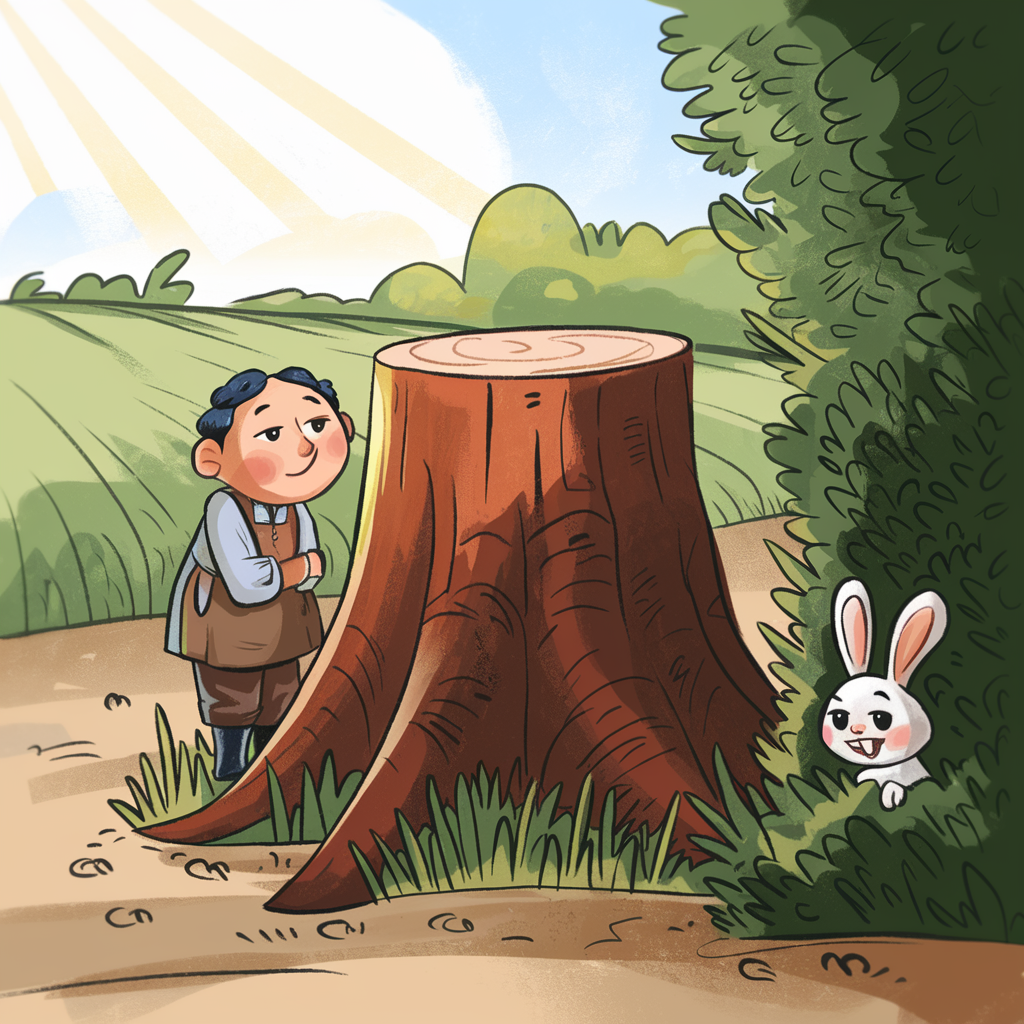Have you ever found yourself waiting around, hoping good fortune will just fall into your lap? Today’s idiom, 守株待兔(shǒu zhū dài tù), captures exactly that feeling—but with a humorous twist.
The phrase translates to “waiting by a tree stump for a rabbit,” drawing on an old story about a farmer who expected luck to strike twice in the same spot.
This idiom reminds us that simply waiting for opportunity isn’t enough; we have to take action to create our own success.
In this article, we’ll break down the meaning, origin, and modern applications of 守株待兔, along with examples that will make it easy to use in your daily life. Let’s jump in!
Definition of 守株待兔
Traditional Chinese: 守株待兔
Simplified Chinese: 守株待兔
Pinyin: shǒuzhū dàitù
English Translation: “Waiting by a tree stump for a rabbit”
Definition: This idiom means waiting idly for success or opportunity without putting in effort, hoping that good fortune will simply fall into one’s lap. 守株 means “guarding a tree stump,” and 待兔 translates to “waiting for a rabbit.” The imagery comes from a story in which a farmer, after seeing a rabbit accidentally crash into a tree stump and die, begins waiting by the stump, hoping for another rabbit to do the same.
History of 守株待兔
The idiom 守株待兔 originates from a story in the ancient Chinese text “Han Feizi” (韓非子), a collection of philosophical writings attributed to the scholar Han Fei during the Warring States period.
This story critiques passive reliance on luck rather than active effort. In the tale, a farmer witnesses a rabbit accidentally run into a tree stump and die. Surprised by his unexpected bounty, the farmer decides to abandon his usual work in favor of waiting by the stump, hoping another rabbit might run into it.
However, this approach leaves him empty-handed and mocked by others for his foolishness.
Over time, 守株待兔 evolved to capture the essence of complacency and over-reliance on luck in both personal and professional contexts. This cautionary tale remains relevant, reminding people of the importance of active work and realistic expectations in achieving success.
Modern Usage of 守株待兔
In modern Mandarin, 守株待兔 is used to describe someone who waits idly for success or opportunity, hoping for luck instead of taking proactive steps. This idiom often implies criticism, suggesting that relying solely on chance is a foolish and unproductive approach.
In Taiwan and other less well-known countries where Chinese is spoken, 守株待兔 might be used to describe someone who avoids risk, waiting for rewards to come without making any effort, whether in career, relationships, or personal goals.
The idiom is commonly used in business or academic contexts where persistence and initiative are valued. For example, if someone is hoping to achieve success in their career but makes no effort to improve their skills or seek out opportunities, others might say they are 守株待兔.
The idiom serves as a reminder that hard work, rather than luck alone, is necessary for meaningful achievement.
In everyday conversation, 守株待兔 might be used in a light-hearted way to tease someone who chooses inaction, expecting circumstances to change on their own. Its meaning and message are timeless, encouraging people to put in consistent effort rather than rely passively on external circumstances.
3 Example Sentences of 守株待兔
- 如果你什麼都不做,只是守株待兔,那成功永遠不會自己來找你。
- 他每天只是在公司打卡上下班,不求進步,真是守株待兔的典型。
- 期望不讀書就能考上好學校,無異於守株待兔。
- Rúguǒ nǐ shénme dōu bù zuò, zhǐshì shǒu zhū dài tù, nà chénggōng yǒngyuǎn bú huì zìjǐ lái zhǎo nǐ.
- Tā měitiān zhǐshì zài gōngsī dǎkǎ shàngxià bān, bù qiú jìnbù, zhēn shì shǒu zhū dài tù de diǎnxíng.
- Qīwàng bù dúshū jiù néng kǎo shàng hǎo xuéxiào, wú yì yú shǒu zhū dài tù.
- 如果你什么都不做,只是守株待兔,那成功永远不会自己来找你。
- 他每天只是在公司打卡上下班,不求进步,真是守株待兔的典型。
- 期望不读书就能考上好学校,无异于守株待兔。
- If you do nothing and just wait around, success will never come to you.
- He clocks in and out at work every day without trying to improve—he’s a classic example of waiting idly for success.
- Expecting to get into a good school without studying is no different from waiting around for success.
Great job learning 守株待兔! This idiom is an important reminder not to rely solely on luck or wait passively for things to go your way.
Instead, take action to create the opportunities you want—success favors those who make the effort.
If you enjoyed learning this idiom, you’ll love exploring even more! Check out this list of 20 useful idioms to expand your vocabulary and gain more insights into Chinese culture. Keep up the great work, and happy studying!




